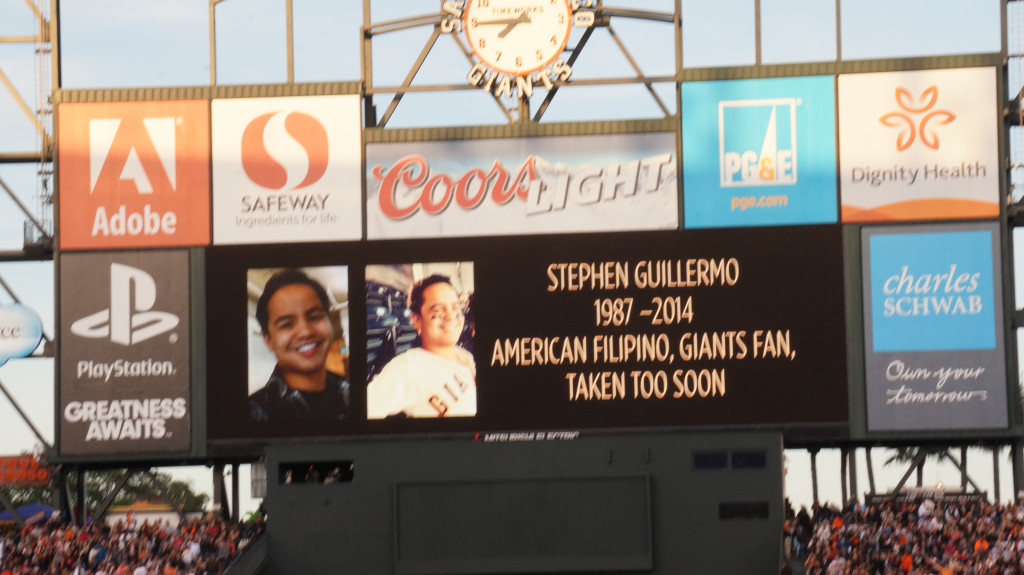
Stephen Guillermo was shot and killed by a retired security guard in San Francisco on May 3, 2014.
It’s been a year now.
The family still hopes we matter in the eyes of the law. But we are still waiting for the DA to share with us records on his case.
Meanwhile, I wrote this piece for my amok column on the AALDEF blog earlier this year.
It’s about a man in Montana who was prosecuted despite the Castle Doctrine defense, which says you can protect your home if an intruder enters and shoot to kill. The presumption is the intruder will do harm, so shoot.
But you can make a mistake.
The shooter in Stephen’s case did.
However, the law is so tough most DAs in the country where the Castle Doctrine applies don’t want to touch these cases.
Blemishes the record.
In San Francisco, they still don’t want to touch Stephen’s case.
In the column I ask SF DA George Gascon about challenging the Castle Doctrine in San Francisco in the same way he campaigned for Prop. 47.
READ THE COLUMN:
Markus Kaarma and Stephen Guillermo
Markus Kaarma’s case is not about police, but about a private individual taking the law into his own hands and relying on Castle Doctrine laws to justify killing an unarmed person.
It was vigilante justice. And Kaarma was wrong.
You may have heard of Kaarma, 29, a Korean American from Montana. His
case didn’t get a lot of play nationally last week, perhaps because he was convicted of deliberate homicide last December.
But his recent sentencing hearing was quite a shocker.
Kaarma thought the Castle Doctrine gave him the right to shoot to kill in order to protect his home. Instead, he was sentenced to 70 years in prison for murdering Diren Dede, a 17-year-old German exchange student.
“You didn’t protect your residence, you went hunting. And here you have a 12 gauge shotgun that’s loaded. Not to protect your family, but to go after somebody,”
said Missoula District Judge Ed McLean on Feb. 12.
The sentence was a surprise. But so was the prosecutor’s initial decision to go forward and charge Kaarma in the first place. That’s been my experience with DAs when it comes to self-defense cases in which the Castle Doctrine is invoked.
I’ve written about Stephen numerous times. And from a victim’s point of view, there are some similarities in the Kaarma case.
Stephen went by mistake to the wrong apartment in his building. The apartment was not his but that of an African immigrant, a retired security guard. Witnesses said they heard no break-in. If so, the door may have been opened so that an unarmed Stephen walked into the apartment and was shot to death by the armed retired security guard.
In Montana, Kaarma left his garage door open, hoping his suspected teenage prankster burglars would come in. When they did, motion detectors alerted Kaarma, who then fired a shotgun four times killing an unarmed teenage intruder in the garage.
Many DAs feel just having a dead body in the house makes the Castle defense unbeatable.
But I’ve always argued that the shooter still must show that he acted reasonably in using deadly force.
Now that Kaarma’s Castle defense failed and his 70 year sentence issued, I’m beginning to feel this could be a breakthrough moment.
Not necessarily for my cousin Stephen’s case.
The San Francisco DA George Gascon had arrested Stephen’s killer, refused to prosecute, and let him go.
No, my hope is that Kaarma’s conviction and sentencing will set the example to rework the homicide laws so that DAs don’t see going up against the Castle defense as a defeat. Prosecutors want to have a winning record. Preferably a win in every case.
Last October, I asked DA Gascon what he needed in order to prosecute anything.
Of course, he said he had to have the facts and the legal analysis. But Gascon also added: “A prosecutor would be violating his ethical obligation if he didn’t believe he could prosecute successfully.”
In other words, it really is “Just win, baby.”
Or “just believe you can win,” a form of political will.
When I mentioned challenging the Castle doctrine, Gascon said individual cases weren’t the place to take ethical, moral, or courageous stands.
As a proper example of when to take a stand, he pointed to his advocacy of California’s Prop. 47, which has re-codified California law in order to lower the high incarceration rates of people with mental health and substance abuse problems. Why? Because, as Gascon said, “It doesn’t work.”
Well, Castle really doesn’t work either. Not if you want to prevent innocent people from being killed.
Gascon may have quivered before the Castle Doctrine in the past. But now maybe he’ll take a stand–not for my cousin’s individual case–but for future victims who could be murdered by vigilantes who want to use their guns whenever feel threatened in their home. Even if they’re wrong.


